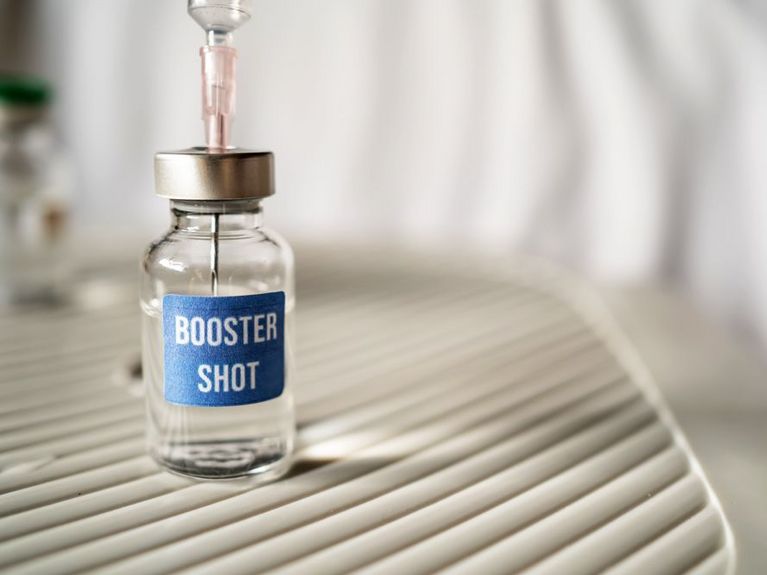Interview
Our vaccines are also effective against variants

How booster vaccination works and why it also protects us against Omicron: An interview with virologist Ulrike Protzer, Institute Director at Helmholtz Munich.
[Translate to Englisch:] Ulrike Protzer ist Institutsdirektorin des Instituts für Virologie bei Helmholtz Munich und Leiterin des Instituts für Virologie an der TU München. (Bild: Helmholtz Munich)
The first infections by Omicron, the new variant of the Corona virus, have become known in Germany. Ms. Protzer, how dangerous do you consider this variant?
We don't yet have enough data to make a conclusive assessment of the new variant. What is clear, however, is that Omicron is a completely new variant of the Corona virus with very many changes on its surface. These mutations indicate that the virus can replicate more quickly and is very likely to evade our immune defenses more easily. In addition, the variant is also more contagious, which is already evident in South Africa, where Omicron is spreading rapidly. We have to expect that here with us as well. That is why we are taking the variant very seriously.
Do our vaccines work reliably against Omicron?
Studies on this are currently underway. Initial studies of this variant indicate a reduced ability of antibodies to neutralize the virus so that it can no longer spread. This indicates a reduced immune protection after vaccination as well as after a previous infection. This increases the risk of infection. Some therapeutic antibodies also lose their effectiveness. However, this does not mean that we completely lose our vaccination protection, it only weakens. The risk of contracting severe Corona should remain low. After all, a large number of antibodies and T cells have been formed in our bodies as a result of the vaccination. It is extremely unlikely that a variant will succeed in completely bypassing this complex protection. We can also assume that this is the case with Omicron.
Should double-vaccinated people nevertheless wait until a vaccine is on the market that also provides them with optimal protection against Omicron?
Absolutely not! It will certainly be at least three months before we can use an adapted vaccine. With such a highly contagious variant, that is too long to wait. The booster vaccine protects us very, very well against the Delta variant that is currently filling our hospitals in Germany. And the better our immune system is stimulated, the better the protection against the Omicron variant will be. Nevertheless, we must now work at full speed on an adapted vaccine.
How high is this additional protection statistically?
The protection against infection increases elevenfold, against severe disease even 19-fold. However, these data from Israel were collected for the Delta variant. Whether they can be transferred to the Omicron variant remains to be seen. However, the third vaccination clearly protects against the currently circulating Delta variant. I am therefore very pleased that the booster campaign is finally gaining momentum in Germany.
What exactly happens in the body during a booster vaccination? Is the process different from the first two vaccinations?
No, but it significantly boosts the immune defenses once again. You have to think of it like this: The first vaccination wakes up the immune system because it is presented with a substance that it does not yet know, but our defense system has such contacts regularly, so the immune response is not yet very strong. The second vaccination sends a clear signal to the immune system: Watch out, this pathogen keeps coming back and it can be dangerous because it triggers inflammations. These are harmless, we feel them as side effects, but they ensure that our body forms a more stable immune response, both by means of antibodies and T-cells. However, if the immune system then does not come into contact with the virus for a longer period of time, it merely stores some memory cells, and the number of antibodies also decreases.
The moment when booster vaccination becomes necessary?
Exactly. If we confront our immune system for the third time, we wake up these memory cells again. They then produce larger amounts of effector cells, i.e., fully armed T cells, and also of antibodies, thus ensuring effective basic immunization.
Triple vaccinations are well known and successful in medicine. Could this also be the case with Corona?
Unfortunately, we cannot yet say how long the vaccination protection will last after boosting, most likely longer than after the second vaccination. But whether further boosters will be needed beyond that, we simply don't know yet.
Could it be like the flu shot, which needs to be boosted annually?
Flu viruses are much more variable than the SARS-CoV-2 virus. That's why, unfortunately, we don't manage a good basic immunization with the flu. This is different with Corona, although of course it is not yet entirely clear whether the virus presents us with a new variant every year or whether its evolution is dead. Our vaccines are very likely to be effective against these variants as well, even if they are attenuated. In that case, they will have to be adapted. From a scientific point of view, therefore, there are good reasons to believe that we will not have to constantly re-vaccinate ourselves in the future.
Readers comments